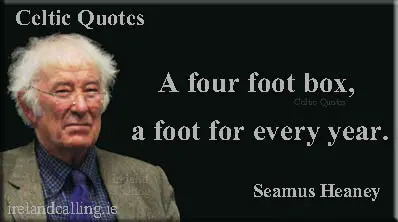Mid-Term Break is a remarkable poem by a writer at the height of his powers. Heaney says he wrote it very quickly many years after the event with virtually no revisions.
The story is told in a very under-stated way. There are no vivid descriptions of displays of grief; everything is very matter of fact.
Even the title is understated; this is about the death of a child but the title is simply Mid-Term Break – something that could cover totally mundane events.
Mid-term Break
Ireland’s 100 favourite poems
Seamus Heaney
The understatement is typical of Heaney and doesn’t mean there was no emotion, but rather that extravagant language is superfluous in moments of such extreme tragedy.
The loss is so great that it needs no embellishment, and the poem gains so much of its power from its simple approach in describing what happened.

Mid-term Break
I sat all morning in the college sick bay
Counting bells knelling classes to a close.
At two o’clock our neighbours drove me home.
In the porch I met my father crying
He had always taken funerals in his stride
And Big Jim Evans saying it was a hard blow.
The baby cooed and laughed and rocked the pram
When I came in, and I was embarrassed
By old men standing up to shake my hand
And tell me they were ‘sorry for my trouble,’
Whispers informed strangers I was the eldest,
Away at school, as my mother held my hand
In hers and coughed out angry tearless sighs.
At ten o’clock the ambulance arrived
With the corpse, stanched and bandaged by the nurses.
Next morning I went up into the room. Snowdrops
And candles soothed the bedside; I saw him
For the first time in six weeks. Paler now,
Wearing a poppy bruise on his left temple,
He lay in the four foot box as in his cot.
No gaudy scars, the bumper knocked him clear.
A four foot box, a foot for every year.

The young Heaney has to wait all morning in his school’s sick bay waiting for his neighbours to drive him home.
The line “counting bells knelling classes” suggests the tedium of waiting for the morning to pass but it also suggests funeral bells that will echo later.
The next few verses conjure up the awkwardness of funerals where people have no words to express their grief.
Big Jim Evans says it was a hard blow, which seems a woefully inadequate description yet reflects the way people may speak when faced with indescribable tragedy.
Heaney feels all the awkwardness of a young boy suddenly being treated with sympathy and respect by adults who would usually treat him as a child. In this time of sorrow, they stand up to shake his hand and say they’re “sorry for his trouble”.
The reference to “poppy bruise” in the final verse creates a sense of frustration and impotence that such a small looking blow could have such a devastating effect. The poppy, of course, is a flower associated with death and remembrance.
No gaudy scars, the bumper knocked him clear
The final lines are the most powerful in the poem.
No gaudy scars, the bumper knocked him clear.
A four foot box, a foot for every year.
We already know someone has died and with a four foot coffin we know it must be someone young, In spite of these warnings, the final line still comes as shock, creating intense emotion.
These last two lines are the only lines in whole poem that rhyme. The effect of the rhyme is to bring a sense of finality, as in the finality of death.
